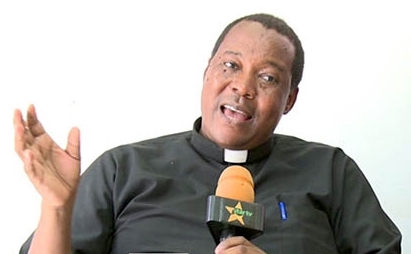TANZANIA: TEC wants government to adopt Social Market Economy to eradicate poverty

Fr. Dr Charles Kitima Secretary-General of the Tanzania Episcopal Conference (TEC)
Sarah Pelaji
Tanzania Episcopal Conference insists that Government must adopt a new economic model, the Social Market economy, which aims at having a nation with sustainable and inclusive economic growth, enables participation and development for all.
The proposed model came out after a scientific research and analysis from economists from Mzumbe University, St Augustine University of Tanzania (SAUT) and Dar es Salaam University under the coordination of religious leaders in Tanzania.
The minds behind this economic model (Alfred Muller Armack, Walter Eucken, Leonhard Miksch, Franz Bohm, Wilhelm Ropke, Alexander Rustow, Konrad Adenauer and Ludwig Erhard) had as a vision ‘to strengthen and build citizens economy under their own government’.
According to a statement made by the Secretary-General of Tanzania Episcopal Conference (TEC) Rev. Charles Kitima, “Tanzania needs a clear economic ideology with focus on the country’s development activities towards an inclusive economy in which free trade and competition are balanced. This balance comes from the state as a referee and from citizens who are at the centre of Tanzania actions and decisions.’’
This he said while opening a one-day seminar to media editors on how engage in the adaptation of social market economy.
In order to get rid of poverty of its citizens and to promote the country’s economy, he said that it is time for the editors to prioritize analyzing policies, plans and economic principles that will respond to the construction of a market economy.
“This model we have researched since 2016, and we are convinced that it is the best model that will enable Tanzanian to create a sustainable economy for its citizenry,” said Fr Kitima
He added that the uniqueness of the Social Market Framework is how it links the free market economy with the role of government in controlling the country’s economic growth, it is to ensure justice for all and to promote fair competition.
While creating an inclusive economy-building system, Fr Kitima said that the model helps reduce inflation and unemployment and it also improves the working environment by promoting social well-being.
“We did some research by visiting different countries that have successfully built the economy from this model, during the study. We went to Germany which is one of the most successful countries through this model, to learn how to build and run this economy in our country,’ added Fr. Kitima
“So far how have we managed various income activities? And are we self-sufficient?” asked Fr Kitima.
He emphasized that for a country to develop, it must have a sound economic system and that is why some countries succeeded in achieving their goals.
”For a nation to be strong, it must have a strong economy. Tanzanian economy is growing but still the most of the citizens are poor, probably because of the methods, philosophies and technologies that have been used and continue to be used now.
He urged journalists through news reports, articles, debates and interviews to make sure they play a major role by coming up with media contents aimed at explaining this economic system.
“You have the responsibility to bringing this economic system into the community as you by carrying the topic to all levels. We cannot do anything for national development without media and where we ignored them we failed, ” he said.
He further reminded the journalists of their responsibility to explain in detail the role of the Social Market Economy and to make this philosophy understood by members of all sectors with the aim of being a sustainable agenda for achieving a middle-class economy and improving our economic system.
For his part, the facilitator of the program, a lecturer at Saint Augustine University of Tanzania Pansian Ntui, said that it was good for the authors to start looking at the policies, laws and regulations governing the economy of the country
Ntui said that in their research, they found out that one of the challenges contributing to the country’s economic failure since independence is the lack of a country’s philosophy and ideology.
“Since we gained Independence we have never had a system to guide the kind of economy we want: between 1961-1985 we followed the socialist economy; 1985-1995 the liberal market system’; between 1995-2005 the privatization system, up to 2005-2015; and from 2015 to the present we are using the industrial economy, this change is making us as a nation lack economic direction” said Ntui.


